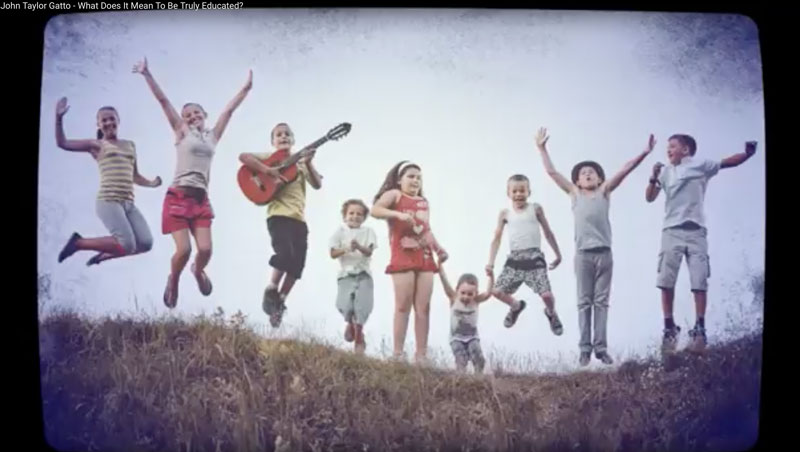This transcript is of an outstanding speech given by John Taylor Gatto on what it means to be truly educated.
Copyright © John Taylor Gatto
John gives his ideas on how education should be framed and what he thinks makes for an educated person. He also details the characteristics of both an Amish education and that of the best boarding schools in the country.
I’ve read most of John’s books and this speech is the best framing of what it means to be truly educated. For parents who want to get started homeschooling their children, this is the perfect place to start.
The transcript is ~11,000 words with the video running 1 hour, 17 minutes. The excerpts, below, are 1/10 of the whole transcript.
(Note: All text, below, is John Taylor Gatto speaking)
Challenge Assumptions
One of the universal marks of an educated man or woman is that they know how to challenge assumptions. They don’t believe everything strangers tell them.
10 Kinds of Awareness to Build On
In the beginning of planning a curriculum, I think you need to consider ten separate kinds of awareness around which self-knowledge and self-awareness are built. The first is a personal reality.
We all need to know as much as we can about our relatives and our ancestors. What were their cultures? What are their cultures? What’re their situations, their goals, their struggles? Then, you need to inventory, by carefully testing your own talents and weaknesses, your own limits that come from your biological and cultural heritage. You just need to get a kind of profile yourself. it doesn’t happen in a week or a month; it’s an ongoing thing. I probably spend a little bit of time every day, at an advanced age thinking, about every single one of my relatives and wondering what part of me I can feel in harmony with that particular person.
Then, you need to have an intimate knowledge of history. I think you need to know local history, regional history, national history, and global history. Starting about 1917, the teaching of history in the United States was systematically and deliberately destroyed so that you wouldn’t be able to step back from your own life and figure out what on earth is going on.
On the other hand, I have some good news for you. It’s a fairly easy and greatly satisfying thing to self-correct that. So, an intimate knowledge of history that would include political history, and cultural history, maybe the history of labor, the history of science and technology, and other relevant forms, that’s the second thing.
The Amish Example
The Amish are a group of 150,000 well-mannered, prosperous, law-abiding people who came to America with little more than the clothes on their back. So they didn’t have any contacts to make the way easy for them and they have been persecuted by the state of Pennsylvania, the state of Wisconsin, the state of Ohio for the whole century.
So everybody’s heard about the Amish, but very few people know the astonishing details, and here they are. Virtually every adult Amish-er has an independent livelihood as the owner of a farm or a business.
The Amish realized that new government schools were social separators built on the principle of mechanical milk separators. They whirl a young mind about until both the social structure of the parents and their coherent consciousness are fragmented. Schools separate children from their personal past and from the past of the culture.
Education, as the government called it, separated people from the daily content of life dividing the world into disciplines, courses, classes, grades and teachers who remain strangers to their children in all but name. Even religion in a government school, if it was mentioned, would be studied analyzed and separated from the family and from daily life. It would become just another subject for critical analysis. Specialists armed with books, separated from the Amish and culture and training, would be entrusted with rearing their children and would encourage their children to liberate themselves from the shackles of home. For what purpose? To jump where? In what direction? of course the school, after it breaks your kids away from you, has no idea.
Boarding School Model
Now let’s take a look at what the parents of the finest and most expensive private boarding schools in America want from schooling.
I’ve been studying their expectations for 20 years, now, in order to compare them with my own goals. And I think you’ll find this interesting even if you don’t agree with all of it. I’m talking about the twenty ritziest private boarding schools in America. Schools like Groton, and St. Paul’s, and Deerfield, and Kent. There are only 20 of them, and some of them say there aren’t 20, there are only 18.
But, I’m going to warn you in advance to take careful notice that none of the principles these wealthy parents seek costs the single penny to develop. I don’t think they know that. That everybody could do one or all of these things with their own kids just as well as Exeter or st. Paul’s could. And I’m going to give you these ideas in no particular order of importance. You decide which of these are important.
Elite private schools want their children to learn good manners and to display those manners to everybody, even the humblest person, without thinking about it. So their manners would be reflexive.
That’s because they know that manners will make their children welcome everywhere, even in strange settings where they’re not known, someone will recognize that this is a well-bred person. Now tell me, does it cost anything at all to teach people good manners? I run into ghetto kids who are as mannerly as anybody on earth.
Undiluted Hard Knowledge
The second thing elite private school parents want is hard intellectual knowledge taught to their children, undiluted; they don’t want it watered down. I never taught any kids younger than 8th graders. But I will tell you that we started in eighth grade with Moby Dick, and as soon as I found out that the school edition had all the hard words and ideas taken out, I just threw it away and went out and bought enough copies for my kids and myself with a real thing. I mean Moby Dick’s is as hard a book to read as I think exists. This is your tough book to read. And what I found was after an initial struggle, maybe it lasted two weeks, the truth is that the dumbest kid and the brightest kid were thrilled with all these ideas interacting with each other and they could see the difference between the plotline of hunting a whale and all the ideas that spun out of the interaction of the crew and the officers and the captain with each other. I mean, it was a thrilling thing to do and I the truth is by that time I had lived in New York for a while, I was tremendously bored with what they handed me to teach.
If you pick up a bestseller from 1818, that would be James Fenimore Cooper’s last of the Mohicans, and you make sure that it’s unexpurgated, you will find yourself struggling to read a book that’s casting off political and scientific and philosophical ideas. I mean you got to read about three pages before the arrow gets out of the quiver. That was a best-seller in 1818. It sold the equivalent of five million copies a book today. It would be an outrageous best seller. It was bought by dirt farmers, and it was read by their kids.
Learn to Draw
Not one of my favorite human beings but the reason Charles Darwin’s book made such an enormous impact was Darwin drew; there are thousands of drawings in the book. And they’re not Rembrandt, but they’re accurate enough that you can see what the thing is. So, developing the powers of accurate observation, it’s not a natural thing to do. We don’t naturally see what’s in front of us or hear what other people say, either. So, some emphasis on that.
Learn How to Handle Pain
This one is a big one: practice in learning how to handle pain. Physical pain, emotional pain, and intellectual pain. If you wonder where the tremendous American interest in sports came from it comes from the aristocratic boarding schools of England that it was translated over here it was done not to win a game but to get people familiar with the idea that pain isn’t very painful, unless you think it is. Otherwise, it just goes away.
What you learn from these things is that you do have, I’ll say the God-given internal resources, but these people knew that you had the internal resources to overcome these things, that it was only to the common people that they seemed impossible to do. Once you tried to do them, they were easy to do, or fairly easy as long as you were disciplined. As long as you understood there was danger, as long as you are confident in yourself. Well, you want those things for your children, anyway.
Homeschooling Hope
I’d say, just to swell your heads here, I think that the homeschoolers are the most exciting contradiction of the direction of the 20th century that I’ve ever heard, seen, or read about. That without the slightest bit of assistance you just grab your bootstraps and lifted yourself up and now that you’re you’re substantial enough all over that you can’t be pushed around so easily.




